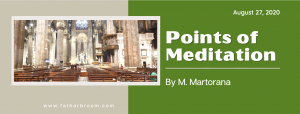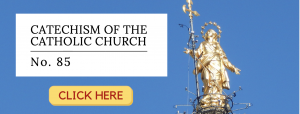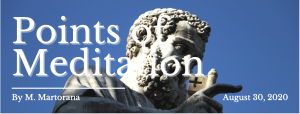
“For greater things you were born.” (Ven. Mother Luisita)
SUNDAY, AUGUST 30th Mt. 16: 21-27 “Jesus began to show his disciples that he must go to Jerusalem and suffer greatly.”
- Peter says in response: “God forbid, Lord! No such thing shall ever happen to you.” Jesus words to Peter are strong: “Get behind me, Satan! You are an obstacle to me. You are thinking not as God does, but as human beings do!”
- Perhaps we would have said the same thing. We don’t want Jesus to suffer, and we don’t want to suffer either! The flesh recoils! We would run from the cross if we could! How often we judge the events in our lives by merely human standards, rather than God’s standards!
- Peter can’t imagine letting the Messiah, the Son of God – remember Peter was the first to profess Jesus as such – suffer and die in this way! He can’t see how Jesus’s suffering and death at the hands of the Jewish leaders will bring any good to them. He can’t conceive of redemption coming through the Cross.
- Isn’t this our human view of suffering? How can this possibly help us? Being laid off work and struggling financially – losing a loved one – suffering a serious accident or illness – falling into serious sin yet again.
- Lord, how can such stumbling blocks in our physical and spiritual life possibly serve you – when we are weak, broken, and can no longer feel your presence?
- The contradiction of the cross! The great mystery that we can’t understand in human terms! St. Paul says, “We proclaim Christ crucified, a stumbling block to Jews and foolishness to Gentiles, but to those who are called, Jews and Greeks alike, Christ is the power of God and the wisdom of God.”
- Our Lady of Fatima revealed to us the power of God and the wisdom of God. She showed three little children a graphic and horrific vision of hell, and said to them: “Souls are going to hell because there is no one to pray and suffer for them.” The salvific power of suffering for ourselves and others! This is our meditation today.
POSITIVE FRUITS OF HUMAN SUFFERING! By Fr Ed Broom, OMV
The purpose of this article is to highlight a list of positive fruits that flow from the person who has united His suffering to the cross of Jesus as well as the Holy Sacrifice of the Mass, where Jesus renews on a daily basis His passion and death through the Sacrament of all Sacraments—the most Holy Eucharist! The following is a list to encourage us to carry our cross more courageously, following in the footsteps of Jesus and His friends, the saints. With Saint Francis of Assisi, we acclaim: “We adore you, O Christ, and we bless you, because by your holy cross you have redeemed the world.”
1. UNION WITH AND IMITATION OF CHRIST. The name Christian means follower or disciple of Christ. By suffering with courage, we are united more with Jesus our Savior; we become more like Him and we imitate Him all the more closely.
2. GROWTH IN PRAYER. In crucial moments of intense suffering, true followers of Christ pray all the more fervently in imitation of Jesus. In the Garden of Gethsemane, Jesus prayed all the more fervently to the point of shedding huge drops of blood. And it is true that as we deepen our prayer life, we unite ourselves more to Christ and become living sacrifices pleasing to God the Father.
3. HUMILITY. Confronted with excruciating sufferings—be they physical, moral, mental, emotional, family or social, financial, etc.—we find ourselves helpless and like a little child totally dependent upon the care, protection, and love of our Eternal Father and His Divine Providence. Humility really means not depending upon myself and my own limited human resources but depending upon God! “Our help is in the name of the Lord, who made heaven and earth.” (Psalm 124:8) As well as, “The Lord is my Shepherd, there is nothing I shall lack.” (Psalm 23)
4. TRUST. One of the modern spiritual classics is the Diary of Saint Faustina, Divine Mercy in My Soul. This great modern saint suffered intensely, but the more she suffered, the more she trusted in God as her strength and support. So it must be with us; suffering should motivate us to trust in God all the more as the eternal Rock on which we can stand when buffeted by the storms of life.
5. PATIENCE. The nature of all suffering is that it takes a toll on us and finally forces us to practice the virtue of patience—remember the Book of Job. Maybe God Himself has sent us certain sufferings as a means by which we can grow in that all important virtue of PATIENCE! Looking in retrospect on past sufferings that we more or less accepted, we can attest to the fact that we are at least a little more patient in imitation of Jesus, Mary, and the saints. Jesus said: “By your patience you will save your souls.” (Lk 21:19)
6. COMPASSION. Still more, the virtue of compassion can be a recompense and prize for those who are undergoing the fire storm of tribulations and sufferings. A classic example might be a woman who has survived breast cancer and is now healthy and thriving. This woman providentially meets another woman who has been diagnosed with breast cancer. The woman who survived the ordeal can definitely have compassion for and commiserate with the woman just diagnosed. Why? For the simple reason that she went through it herself! Those who suffer in a Christian way, accepting God’s mysterious will, can definitely be compassionate and encouraging with others who are going through the same predicament. Actually the word Compassion means the ability to suffer with another.
7. PURIFICATION. As gold is purified by fire, so are the friends of the Lord purified by the fire of sufferings. Saint John of the Cross gives us the image of a piece of cold and rusty iron cast into the fire. In time, the cold and rusty piece of iron becomes red hot like the fire and the rust disintegrates. So it is with human souls cloaked with sin and sinful tendencies. The willing acceptance of suffering for the love of Christ and in union with Christ, who suffered and died for all of humanity and for each one of us individually, can be a means of purifying our soul by uniting it to the fire of love in the Sacred Heart of Jesus. Indeed, it must be said—we can beg the Lord to give us our Purgatory here on earth, so that we can have quicker access to heaven!
8. DETACHMENT. Due to Original Sin, which we are all born with, the human person has a strong tendency to become attached to persons, places, things, ideas, concepts, etc., many of which are disordered, even to the point of being sinful. A storm blast of suffering can shatter these attachments. If someone has been diagnosed with cancer and given six months to live, they can start to unpack their life, relinquishing what is non-essential, unnecessary, or even sinful, as they prepare for death, judgment and the life to come—Heaven! Indeed, suffering can serve as a sober but very real meditation on the transitory and fleeting nature of human life. “Vanity of vanities, all is vanity” if not rooted in God!
9. SALVATION OF SOULS. The children of Fatima were educated in the school of suffering, especially Jacinta and Francisco Marto—both died almost within two years of the last apparition of Our Lady of Fatima in 1917. After the graphic vision of hell, July 13, 1917, little Jacinta could not undertake too many sacrifices, offering her sufferings for the salvation of immortal souls! Sacrificing her favorite food—the sweet grapes of Portugal, giving up water on hot days, putting up with the painful insistence of people pestering her with questions about the visions, wearing a rough rope around her waist that chafed her skin. Jacinta did all this so as to collaborate with God in the salvation of immortal souls. In other words, her suffering had infinite value because she suffered for and with Jesus. When beatified by Saint Pope John Paul II he gave her the title of little victim soul—such was her thirst for the salvation of immortal souls and her willingness to suffer for them with Jesus!
10. SHORTNESS OF LIFE AND ETERNITY. Finally, in our analysis of the positive meaning of suffering we have to come to terms with our mortality—that all of us one day have to pass through the door of death and this often entails suffering. However, life is very short as the Psalmist reminds us: “Man is like the flower of the field that rises in the morning and withers and dies as the sun goes down.” (Ps 1-3:15) Jesus said these words to Saint Faustina in the Diary: Divine Mercy in My Soul: “You will suffer much, but not for long; you will accomplish my will and my desires and a faithful servant of Mine will help you do this. Now rest on My bosom, on My heart, and draw from it strength and power for these sufferings because you will find neither relief nor help nor comfort anywhere else. Know that you will have much, much to suffer, but don’t let this frighten you; I am with you.” (Diary #36) These words of Jesus are serious, sober, but also consoling. He will always be with us and invites all of us to seek refuge and comfort, not in the things of this passing world, but in His bosom, in His Most Sacred Heart.
May Our Lady of Sorrows console us all with her loving and maternal presence! She will always be present with Jesus to help us carry our cross patiently so as to win the award of heaven that awaits us!
Copyright 2020 Oblates of the Virgin Mary
St. Peter Chanel Church, Hawaiian Gardens, CA

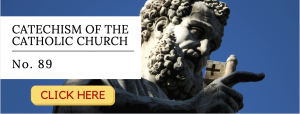

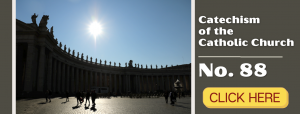
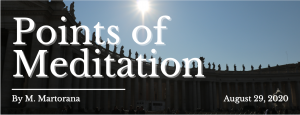

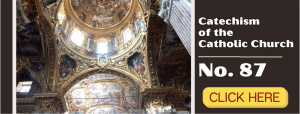
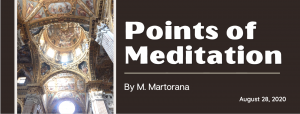
 PART 3: TWENTY-FIVE HELPS TO IMPROVE YOUR CONFESSION by Fr. Ed Broom, OMV
PART 3: TWENTY-FIVE HELPS TO IMPROVE YOUR CONFESSION by Fr. Ed Broom, OMV 

